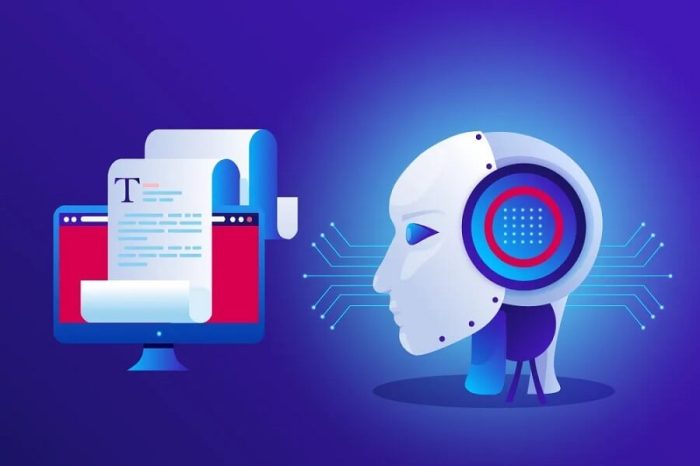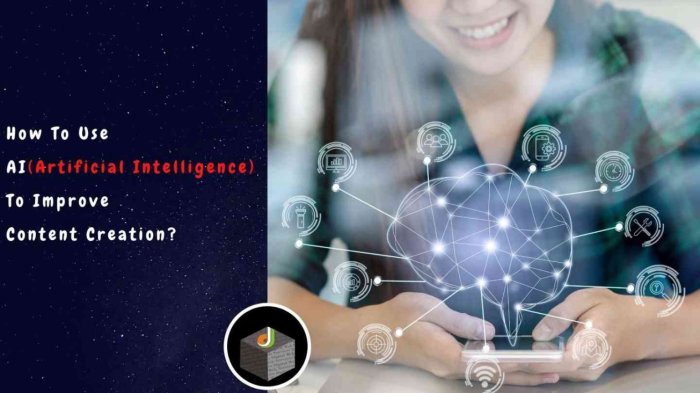Kicking off with Using AI for Content Creation, this cutting-edge topic delves into the world of artificial intelligence and its impact on content creation. From sparking creativity to streamlining processes, AI is reshaping the way we write and produce content. Strap in for a ride through the future of writing!
Understanding AI Content Creation

AI content creation refers to the use of artificial intelligence technology to generate written, visual, or audio content without human intervention. This process involves algorithms that can analyze data, learn patterns, and produce content that is tailored to specific audiences.
Examples of AI in Content Creation
- AI-powered chatbots that engage with users on websites and social media platforms.
- Automated content creation tools that generate blog posts, articles, and social media posts based on s and topics.
- Personalized recommendation engines that suggest content to users based on their preferences and behavior.
Benefits of Using AI for Content Creation
- Increased efficiency: AI can create content at a faster pace than humans, saving time and resources.
- Improved accuracy: AI algorithms can analyze data and produce content that is free from human errors.
- Enhanced personalization: AI can create content that is tailored to the preferences and interests of individual users, leading to higher engagement.
- Cost-effective: AI content creation tools can help businesses reduce the costs associated with hiring content creators.
Types of AI Tools for Content Creation
AI tools have revolutionized the way we create content, offering various options to streamline the process and enhance creativity. Let’s explore some of the key types of AI tools used for content creation:
1. Natural Language Generation (NLG) Tools
NLG tools are designed to generate human-like text based on input data. These tools can produce articles, reports, product descriptions, and more, saving time and effort for content creators. Examples of NLG tools include GPT-3, Quill, and Articoolo.
2. Content Curation Tools
Content curation tools leverage AI algorithms to sift through vast amounts of information and curate relevant content for specific topics or audiences. These tools help content creators discover trending topics, monitor competitors, and stay updated on industry news. Popular content curation tools include BuzzSumo, Curata, and Feedly.
3. Content Optimization Tools
AI-powered content optimization tools analyze data and user behavior to improve the performance of content. These tools suggest s, optimize headlines, and recommend changes to enhance and engagement. Tools like Clearscope, MarketMuse, and SEMrush fall under this category.
4. Visual Content Creation Tools
Visual content creation tools use AI to generate images, videos, and graphics that resonate with audiences. These tools help in creating visually appealing content for social media, websites, and marketing campaigns. Canva, Adobe Spark, and Promo are popular examples of visual content creation tools.
5. Translation Tools
AI translation tools enable content creators to translate text from one language to another efficiently. These tools ensure accurate translations while maintaining the tone and context of the original content. Google Translate, DeepL, and Microsoft Translator are widely used AI translation tools.
AI Content Creation Process
Using AI for content creation involves a series of steps that combine technology and human input to generate high-quality content efficiently. AI algorithms play a crucial role in this process, utilizing machine learning and natural language processing to produce relevant and engaging content.
AI Content Generation Steps
- 1. Data Collection: AI algorithms gather information from various sources to understand the topic and target audience.
- 2. Topic Analysis: The AI analyzes the collected data to identify key themes, trends, and relevant s for content creation.
- 3. Content Generation: Based on the analyzed data, AI algorithms generate written content, including articles, blog posts, social media posts, and more.
- 4. Editing and Optimization: Human input is essential at this stage to review and refine the AI-generated content, ensuring accuracy, coherence, and relevance.
- 5. Publication: Once the content is finalized, it can be published across various platforms to reach the target audience.
AI Algorithms in Content Creation
AI algorithms use deep learning models and language generation techniques to create content that mimics human writing. These algorithms can generate text, images, and even audio content by analyzing vast amounts of data and learning from patterns in language and style.
Human Input in AI Content Creation
While AI algorithms are capable of creating content independently, human input is crucial to ensure the final output meets quality standards. Humans provide creativity, critical thinking, and emotional intelligence that AI may lack, helping to refine the content and make it more engaging for the audience.
Applications of AI in Content Creation: Using AI For Content Creation

AI has revolutionized content creation across various industries, offering innovative solutions and streamlining processes. By leveraging AI technologies, businesses can generate personalized, engaging, and high-quality content at scale, enhancing their marketing strategies and customer experiences.
Enhanced Personalization
AI-powered tools enable companies to analyze vast amounts of data to understand consumer preferences and behaviors. This data-driven approach allows businesses to create tailored content that resonates with their target audience, leading to increased engagement and conversions.
Automated Content Generation
AI algorithms can generate content automatically, ranging from product descriptions to social media posts. This automation saves time and resources for businesses while ensuring consistency and efficiency in content creation processes.
Content Optimization
AI tools can analyze content performance metrics in real-time and provide insights for optimization. By leveraging AI-powered analytics, businesses can refine their content strategies, improve rankings, and enhance overall content quality.
Virtual Assistants and Chatbots
AI-powered virtual assistants and chatbots can interact with users in real-time, providing personalized recommendations and assistance. These tools enhance customer engagement and support content creation efforts by delivering relevant information to users efficiently.
Visual Content Creation
AI technologies enable the creation of visually appealing content, such as image and video editing tools. By automating tasks like image enhancement and video editing, businesses can produce high-quality visual content for marketing campaigns and branding initiatives.
Future Potential
The future of AI in content creation holds immense potential for innovation and growth. As AI technologies continue to evolve, businesses will leverage advanced capabilities to create more personalized, compelling, and impactful content that resonates with audiences on a deeper level.
Ethical Considerations in AI Content Creation
When it comes to using AI for content creation, there are several ethical considerations that need to be taken into account. As AI technology continues to advance, it is important to address the potential ethical issues that may arise from the use of AI in generating content.
One of the main concerns related to AI-generated content is the spread of misinformation. With AI’s ability to create content at a rapid pace, there is a risk of false or misleading information being disseminated to a wide audience. This can have serious consequences, especially in fields like journalism where accuracy and credibility are crucial.
To address these ethical dilemmas in AI content creation, it is essential to implement strict guidelines and quality control measures. Content creators should ensure that the AI tools they use are programmed to prioritize accuracy and reliability. Additionally, human oversight and fact-checking should always be incorporated into the content creation process to verify the information generated by AI.
Misinformation Concerns, Using AI for Content Creation
- AI-generated content can spread false information rapidly.
- Accuracy and credibility are compromised in content creation.
- Impact on journalism and public perception.
Quality Control Measures
- Implement strict guidelines for AI-generated content.
- Ensure accuracy and reliability are prioritized in content creation.
- Incorporate human oversight and fact-checking into the process.
